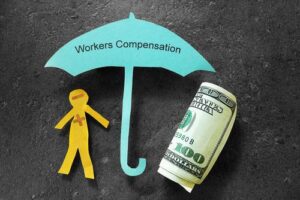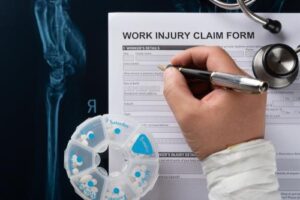
Usually, workers’ compensation and unemployment benefits cannot be received simultaneously in Georgia. These two programs serve different purposes and don’t overlap.
However, if your workers’ compensation claim is taking too long and you cannot work, you may be able to get unemployment benefits while you wait for your workers’ compensation claim to get approved. Once approved, unemployment insurance will end, and you’ll continue benefits with workers’ comp.
Whether you can do this depends on your situation, so speak with an Atlanta workers’ compensation lawyer for advice on how to proceed.
The Differences Between Workers’ Compensation and Unemployment in Georgia
Workers’ compensation is a system designed to provide financial support and medical benefits to employees who suffer work-related injuries or illnesses. When you’re receiving workers’ compensation benefits, it typically means you’re unable to work due to your injury or illness.
Unemployment benefits, on the other hand, are designed to provide temporary financial assistance to individuals who have lost their jobs through no fault of their own. To qualify for unemployment in Georgia, you must be able and available to work, actively seeking employment, and meet wage requirements.
In other words, unemployment benefits people who can work but do not have a job, and workers’ compensation benefits people who cannot work due to a job-related injury or illness. These are two separate programs meant to address different situations that could put someone out of work.
Get the strong arm
Can You Receive Both Benefits Simultaneously?
In Georgia, you cannot receive both workers’ compensation and unemployment benefits at the same time. To receive workers’ compensation, you must be unable to work due to your injury. Conversely, you must be able and available to work to qualify for unemployment.
These conditions are mutually exclusive in most cases. However, there are situations where you start with one benefit and then switch to another. For instance, if your temporary total disability benefits end, but you’re still unable to return to your previous job, you might qualify for unemployment.
More commonly, in cases where your workers’ compensation claim is disputed or denied, you can apply for unemployment benefits while the dispute is being resolved. If your workers’ comp ends up being more than your unemployment, you may get the difference after approval.
What About Partial Disability Benefits?
Temporary partial disability benefits may let you work in a limited capacity. According to the Georgia Department of Labor, you’re not eligible for unemployment benefits if you are receiving these benefits. According to their webpage, the only way to know for sure is to apply for unemployment.
Be Careful of Fraud
Collecting workers’ compensation and unemployment benefits simultaneously could be considered fraud if you purposefully lie on your applications to get both. This can result in severe penalties, including:
- Criminal charges
- Fines and restitution
- Disqualification from future benefits
Even without intentional fraud, receiving benefits you’re not entitled to can lead to financial complications. You may be required to repay any improperly obtained benefits, which can create significant financial hardship.
To avoid fraud accusations, it’s crucial to be completely honest and transparent in all your dealings with the workers’ compensation system and the unemployment office. Report any changes in your employment status, income, or medical condition promptly.
How to Transition from Workers’ Compensation to Unemployment
When you’ve reached maximum medical improvement but can’t return to your old job, you may be able to switch to unemployment instead of workers’ compensation. You’ll need to be prepared when this happens.
You’ll need to meet the job search requirements for unemployment insurance to show you’re looking for work. You will also need to coordinate the end of your workers’ compensation with the start of unemployment to avoid a gap in income.
This transition period can be tricky, and it’s often beneficial to have legal guidance to ensure you don’t inadvertently violate any rules or lose out on benefits.
What to Do if Your Workers’ Compensation Claim Is Denied
You may be in a difficult situation if your workers’ compensation claim is denied. You have the right to appeal a denied workers’ compensation claim in Georgia, but first, you should review the denial letter carefully to understand why your claim was rejected.
You’ll need to gather documentation to address the reason for the rejection and make an appeal to the workers’ compensation board before the deadline in your letter. While your appeal is pending, you might be eligible for unemployment benefits.
It’s advisable to consult with an experienced workers’ compensation attorney who can guide you through the appeal process and help you understand your options for both unemployment and workers’ compensation in Georgia.
Contact a Workers’ Compensation Attorney for More Information
Understanding the interplay between workers’ compensation and unemployment benefits in Georgia is complicated. While you cannot receive both at the same time, people can switch from one to the other.
Don’t let confusion about unemployment and workers’ comp prevent you from receiving the support you need. Contact John Foy & Associates today for a comprehensive evaluation of your situation.
404-400-4000 or complete a Free Case Evaluation form





